Person-Centered Therapy: Theory, Practice, and Impact in Psychology
VerifiedAdded on 2022/09/01
|7
|1463
|11
Essay
AI Summary
This essay provides a comprehensive overview of Carl Rogers' person-centered therapy, a humanistic approach to counseling that emphasizes empathy, genuineness, and unconditional positive regard. It explores the core principles of the therapy, including the belief in each individual's capacity for self-actualization and the importance of the therapeutic relationship. The essay discusses the strengths of the approach, such as its focus on client empowerment and self-discovery, and also addresses its limitations, including the need for client motivation and the potential challenges in specific client populations. Furthermore, it examines the influence of Rogers' work on the field of psychology and counseling, highlighting its lasting impact on therapeutic practices and the development of client-centered approaches. The essay also compares person-centered therapy with psychodynamic approaches, highlighting the differences in their focus on the past versus the present and positive beliefs versus negative aspects. Overall, the essay emphasizes the contributions of Rogers' person-centered therapy to the field of psychology and counseling, providing a platform for clients to explore their inner feelings and develop themselves. The essay is contributed by a student to be published on the website Desklib, a platform which provides all the necessary AI based study tools for students.
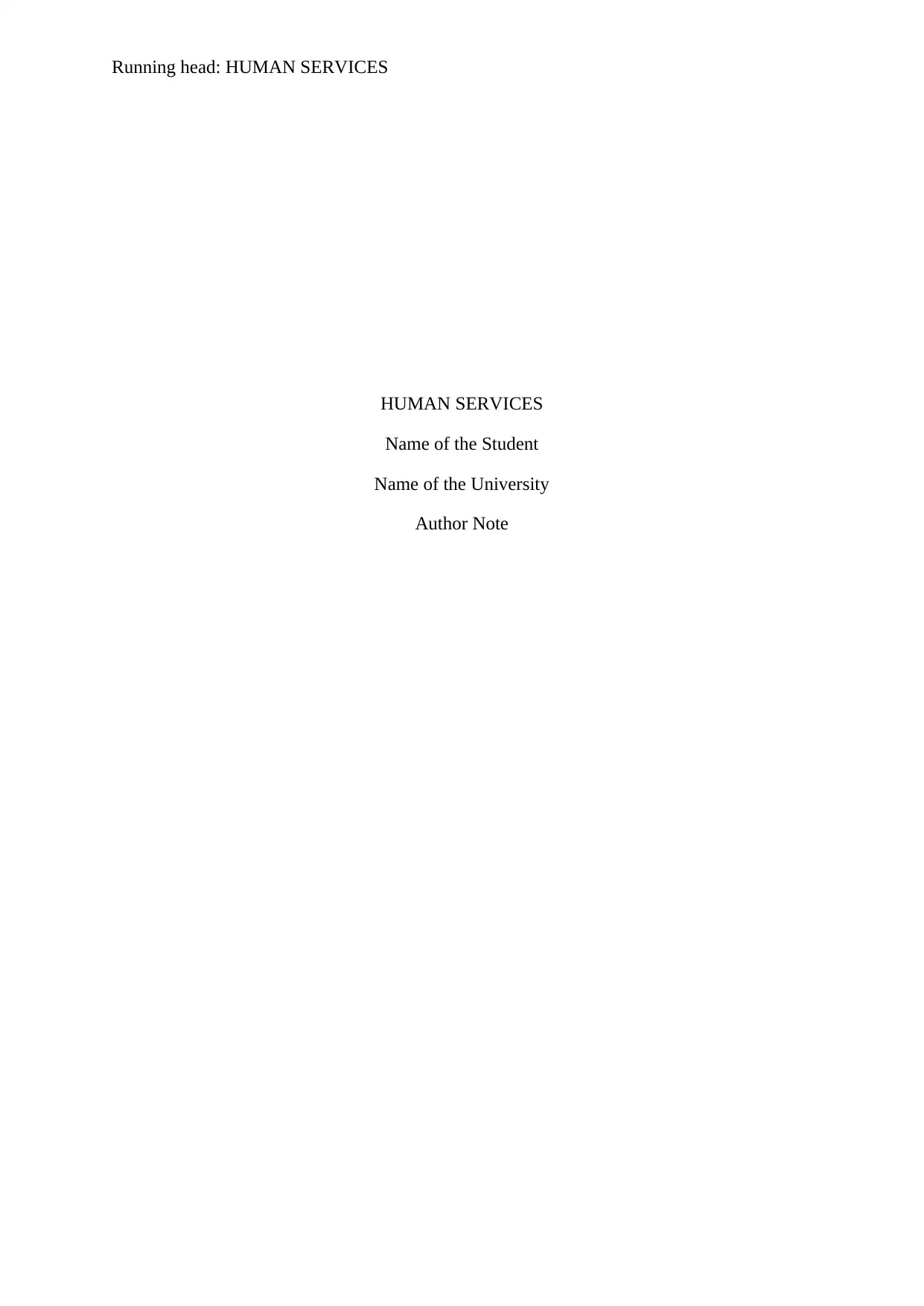
Running head: HUMAN SERVICES
HUMAN SERVICES
Name of the Student
Name of the University
Author Note
HUMAN SERVICES
Name of the Student
Name of the University
Author Note
Paraphrase This Document
Need a fresh take? Get an instant paraphrase of this document with our AI Paraphraser
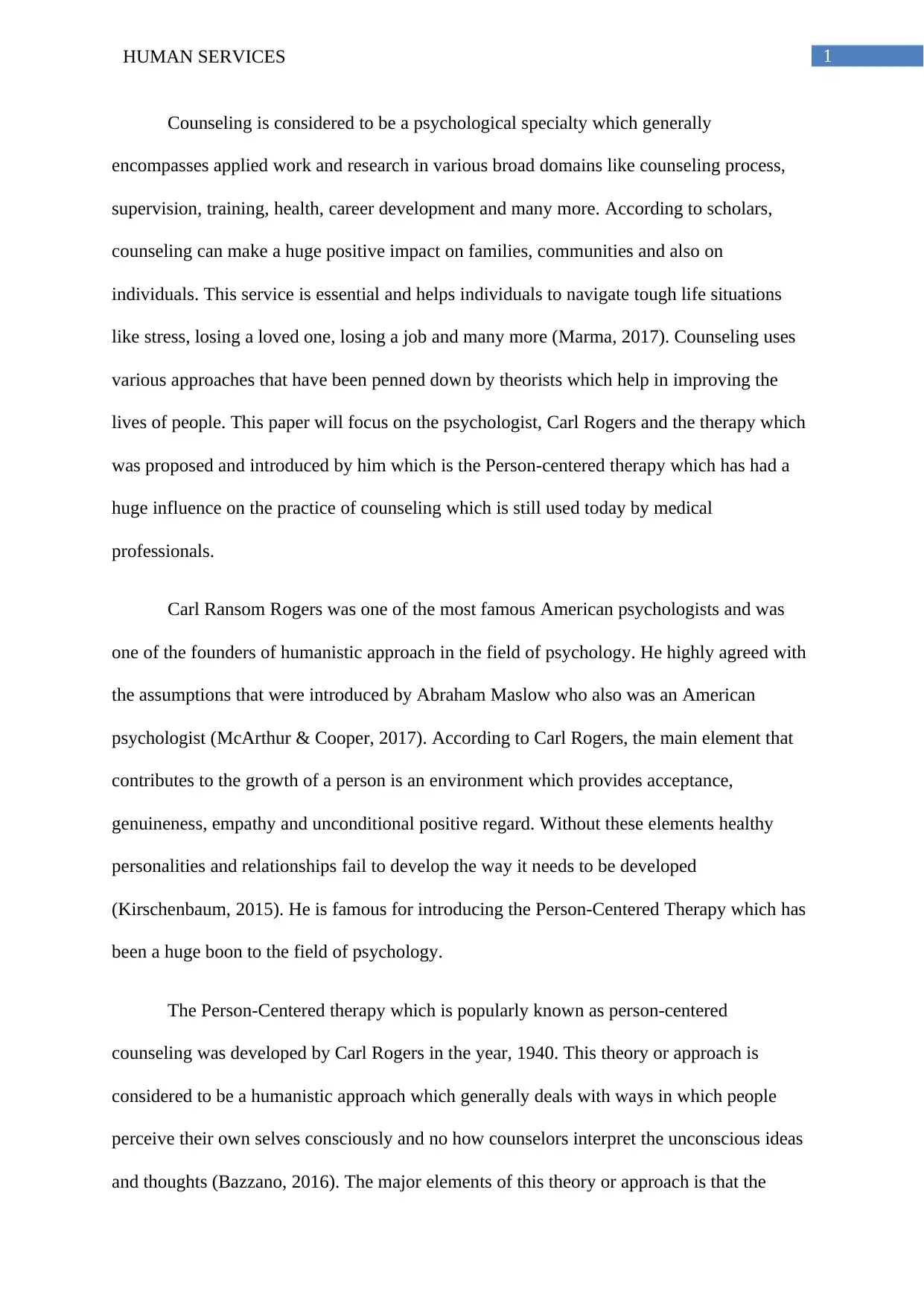
1HUMAN SERVICES
Counseling is considered to be a psychological specialty which generally
encompasses applied work and research in various broad domains like counseling process,
supervision, training, health, career development and many more. According to scholars,
counseling can make a huge positive impact on families, communities and also on
individuals. This service is essential and helps individuals to navigate tough life situations
like stress, losing a loved one, losing a job and many more (Marma, 2017). Counseling uses
various approaches that have been penned down by theorists which help in improving the
lives of people. This paper will focus on the psychologist, Carl Rogers and the therapy which
was proposed and introduced by him which is the Person-centered therapy which has had a
huge influence on the practice of counseling which is still used today by medical
professionals.
Carl Ransom Rogers was one of the most famous American psychologists and was
one of the founders of humanistic approach in the field of psychology. He highly agreed with
the assumptions that were introduced by Abraham Maslow who also was an American
psychologist (McArthur & Cooper, 2017). According to Carl Rogers, the main element that
contributes to the growth of a person is an environment which provides acceptance,
genuineness, empathy and unconditional positive regard. Without these elements healthy
personalities and relationships fail to develop the way it needs to be developed
(Kirschenbaum, 2015). He is famous for introducing the Person-Centered Therapy which has
been a huge boon to the field of psychology.
The Person-Centered therapy which is popularly known as person-centered
counseling was developed by Carl Rogers in the year, 1940. This theory or approach is
considered to be a humanistic approach which generally deals with ways in which people
perceive their own selves consciously and no how counselors interpret the unconscious ideas
and thoughts (Bazzano, 2016). The major elements of this theory or approach is that the
Counseling is considered to be a psychological specialty which generally
encompasses applied work and research in various broad domains like counseling process,
supervision, training, health, career development and many more. According to scholars,
counseling can make a huge positive impact on families, communities and also on
individuals. This service is essential and helps individuals to navigate tough life situations
like stress, losing a loved one, losing a job and many more (Marma, 2017). Counseling uses
various approaches that have been penned down by theorists which help in improving the
lives of people. This paper will focus on the psychologist, Carl Rogers and the therapy which
was proposed and introduced by him which is the Person-centered therapy which has had a
huge influence on the practice of counseling which is still used today by medical
professionals.
Carl Ransom Rogers was one of the most famous American psychologists and was
one of the founders of humanistic approach in the field of psychology. He highly agreed with
the assumptions that were introduced by Abraham Maslow who also was an American
psychologist (McArthur & Cooper, 2017). According to Carl Rogers, the main element that
contributes to the growth of a person is an environment which provides acceptance,
genuineness, empathy and unconditional positive regard. Without these elements healthy
personalities and relationships fail to develop the way it needs to be developed
(Kirschenbaum, 2015). He is famous for introducing the Person-Centered Therapy which has
been a huge boon to the field of psychology.
The Person-Centered therapy which is popularly known as person-centered
counseling was developed by Carl Rogers in the year, 1940. This theory or approach is
considered to be a humanistic approach which generally deals with ways in which people
perceive their own selves consciously and no how counselors interpret the unconscious ideas
and thoughts (Bazzano, 2016). The major elements of this theory or approach is that the
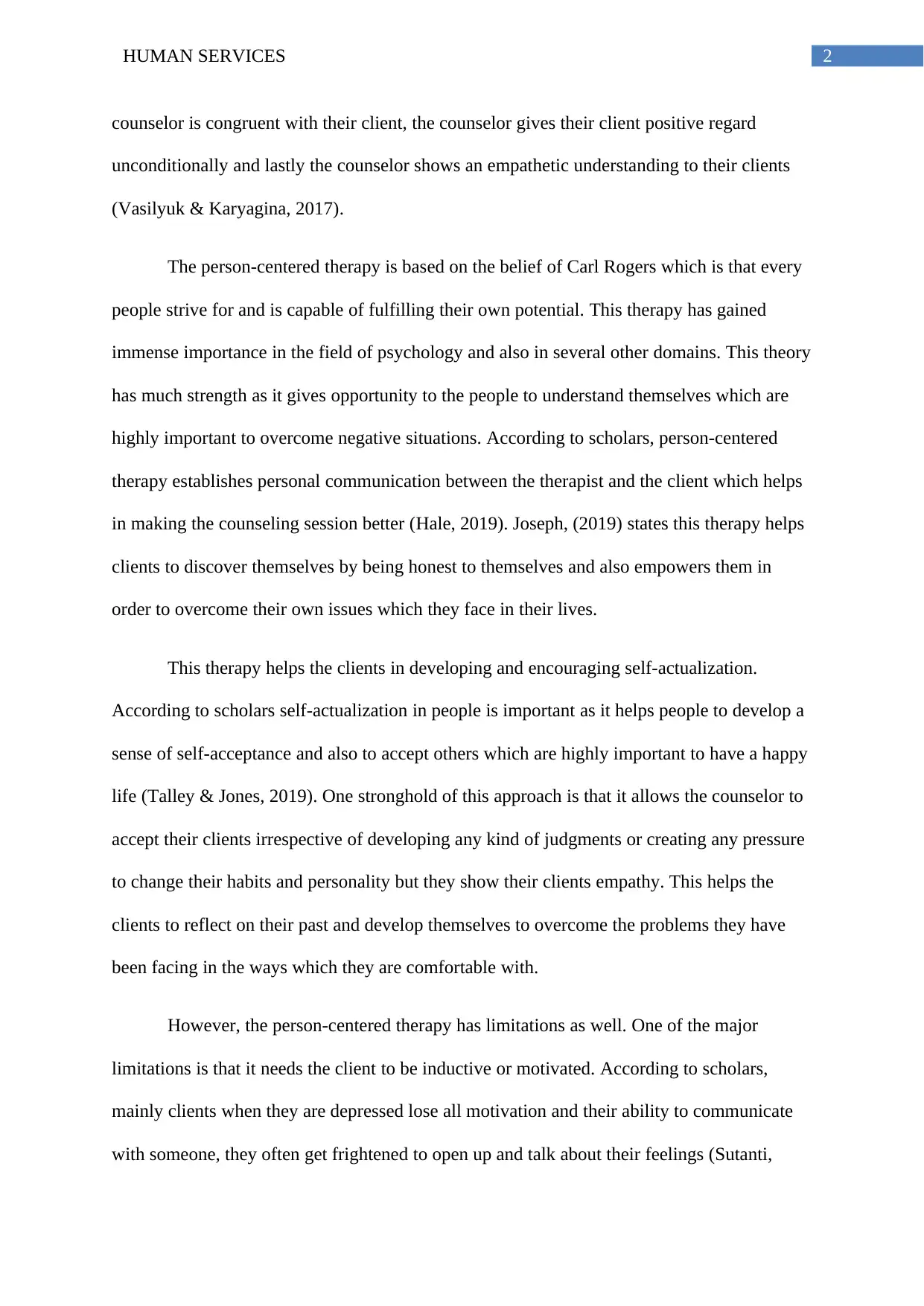
2HUMAN SERVICES
counselor is congruent with their client, the counselor gives their client positive regard
unconditionally and lastly the counselor shows an empathetic understanding to their clients
(Vasilyuk & Karyagina, 2017).
The person-centered therapy is based on the belief of Carl Rogers which is that every
people strive for and is capable of fulfilling their own potential. This therapy has gained
immense importance in the field of psychology and also in several other domains. This theory
has much strength as it gives opportunity to the people to understand themselves which are
highly important to overcome negative situations. According to scholars, person-centered
therapy establishes personal communication between the therapist and the client which helps
in making the counseling session better (Hale, 2019). Joseph, (2019) states this therapy helps
clients to discover themselves by being honest to themselves and also empowers them in
order to overcome their own issues which they face in their lives.
This therapy helps the clients in developing and encouraging self-actualization.
According to scholars self-actualization in people is important as it helps people to develop a
sense of self-acceptance and also to accept others which are highly important to have a happy
life (Talley & Jones, 2019). One stronghold of this approach is that it allows the counselor to
accept their clients irrespective of developing any kind of judgments or creating any pressure
to change their habits and personality but they show their clients empathy. This helps the
clients to reflect on their past and develop themselves to overcome the problems they have
been facing in the ways which they are comfortable with.
However, the person-centered therapy has limitations as well. One of the major
limitations is that it needs the client to be inductive or motivated. According to scholars,
mainly clients when they are depressed lose all motivation and their ability to communicate
with someone, they often get frightened to open up and talk about their feelings (Sutanti,
counselor is congruent with their client, the counselor gives their client positive regard
unconditionally and lastly the counselor shows an empathetic understanding to their clients
(Vasilyuk & Karyagina, 2017).
The person-centered therapy is based on the belief of Carl Rogers which is that every
people strive for and is capable of fulfilling their own potential. This therapy has gained
immense importance in the field of psychology and also in several other domains. This theory
has much strength as it gives opportunity to the people to understand themselves which are
highly important to overcome negative situations. According to scholars, person-centered
therapy establishes personal communication between the therapist and the client which helps
in making the counseling session better (Hale, 2019). Joseph, (2019) states this therapy helps
clients to discover themselves by being honest to themselves and also empowers them in
order to overcome their own issues which they face in their lives.
This therapy helps the clients in developing and encouraging self-actualization.
According to scholars self-actualization in people is important as it helps people to develop a
sense of self-acceptance and also to accept others which are highly important to have a happy
life (Talley & Jones, 2019). One stronghold of this approach is that it allows the counselor to
accept their clients irrespective of developing any kind of judgments or creating any pressure
to change their habits and personality but they show their clients empathy. This helps the
clients to reflect on their past and develop themselves to overcome the problems they have
been facing in the ways which they are comfortable with.
However, the person-centered therapy has limitations as well. One of the major
limitations is that it needs the client to be inductive or motivated. According to scholars,
mainly clients when they are depressed lose all motivation and their ability to communicate
with someone, they often get frightened to open up and talk about their feelings (Sutanti,
⊘ This is a preview!⊘
Do you want full access?
Subscribe today to unlock all pages.

Trusted by 1+ million students worldwide
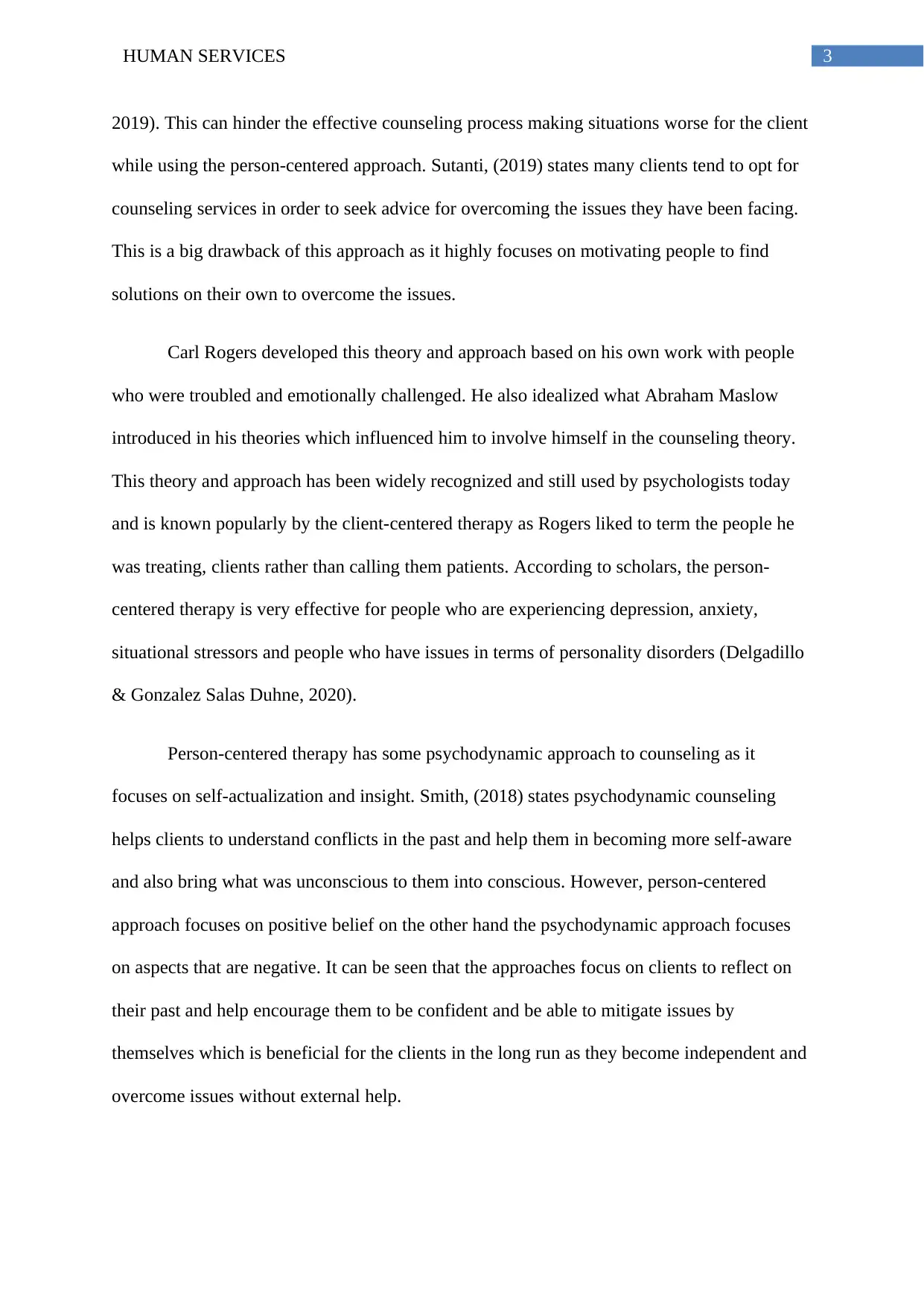
3HUMAN SERVICES
2019). This can hinder the effective counseling process making situations worse for the client
while using the person-centered approach. Sutanti, (2019) states many clients tend to opt for
counseling services in order to seek advice for overcoming the issues they have been facing.
This is a big drawback of this approach as it highly focuses on motivating people to find
solutions on their own to overcome the issues.
Carl Rogers developed this theory and approach based on his own work with people
who were troubled and emotionally challenged. He also idealized what Abraham Maslow
introduced in his theories which influenced him to involve himself in the counseling theory.
This theory and approach has been widely recognized and still used by psychologists today
and is known popularly by the client-centered therapy as Rogers liked to term the people he
was treating, clients rather than calling them patients. According to scholars, the person-
centered therapy is very effective for people who are experiencing depression, anxiety,
situational stressors and people who have issues in terms of personality disorders (Delgadillo
& Gonzalez Salas Duhne, 2020).
Person-centered therapy has some psychodynamic approach to counseling as it
focuses on self-actualization and insight. Smith, (2018) states psychodynamic counseling
helps clients to understand conflicts in the past and help them in becoming more self-aware
and also bring what was unconscious to them into conscious. However, person-centered
approach focuses on positive belief on the other hand the psychodynamic approach focuses
on aspects that are negative. It can be seen that the approaches focus on clients to reflect on
their past and help encourage them to be confident and be able to mitigate issues by
themselves which is beneficial for the clients in the long run as they become independent and
overcome issues without external help.
2019). This can hinder the effective counseling process making situations worse for the client
while using the person-centered approach. Sutanti, (2019) states many clients tend to opt for
counseling services in order to seek advice for overcoming the issues they have been facing.
This is a big drawback of this approach as it highly focuses on motivating people to find
solutions on their own to overcome the issues.
Carl Rogers developed this theory and approach based on his own work with people
who were troubled and emotionally challenged. He also idealized what Abraham Maslow
introduced in his theories which influenced him to involve himself in the counseling theory.
This theory and approach has been widely recognized and still used by psychologists today
and is known popularly by the client-centered therapy as Rogers liked to term the people he
was treating, clients rather than calling them patients. According to scholars, the person-
centered therapy is very effective for people who are experiencing depression, anxiety,
situational stressors and people who have issues in terms of personality disorders (Delgadillo
& Gonzalez Salas Duhne, 2020).
Person-centered therapy has some psychodynamic approach to counseling as it
focuses on self-actualization and insight. Smith, (2018) states psychodynamic counseling
helps clients to understand conflicts in the past and help them in becoming more self-aware
and also bring what was unconscious to them into conscious. However, person-centered
approach focuses on positive belief on the other hand the psychodynamic approach focuses
on aspects that are negative. It can be seen that the approaches focus on clients to reflect on
their past and help encourage them to be confident and be able to mitigate issues by
themselves which is beneficial for the clients in the long run as they become independent and
overcome issues without external help.
Paraphrase This Document
Need a fresh take? Get an instant paraphrase of this document with our AI Paraphraser

4HUMAN SERVICES
Carl Rogers with the person-centered therapy contributed to the field of psychology
and counseling effectively as most of the psychologists and counselors are seen to use the
approaches presented in the theory to provide proper solutions and counseling to their clients.
This approach has helped in providing a platform to the clients to explore their inner and true
feelings which have led them to become better people and have also provided an opportunity
to develop themselves and be a part of the society.
Carl Rogers with the person-centered therapy contributed to the field of psychology
and counseling effectively as most of the psychologists and counselors are seen to use the
approaches presented in the theory to provide proper solutions and counseling to their clients.
This approach has helped in providing a platform to the clients to explore their inner and true
feelings which have led them to become better people and have also provided an opportunity
to develop themselves and be a part of the society.
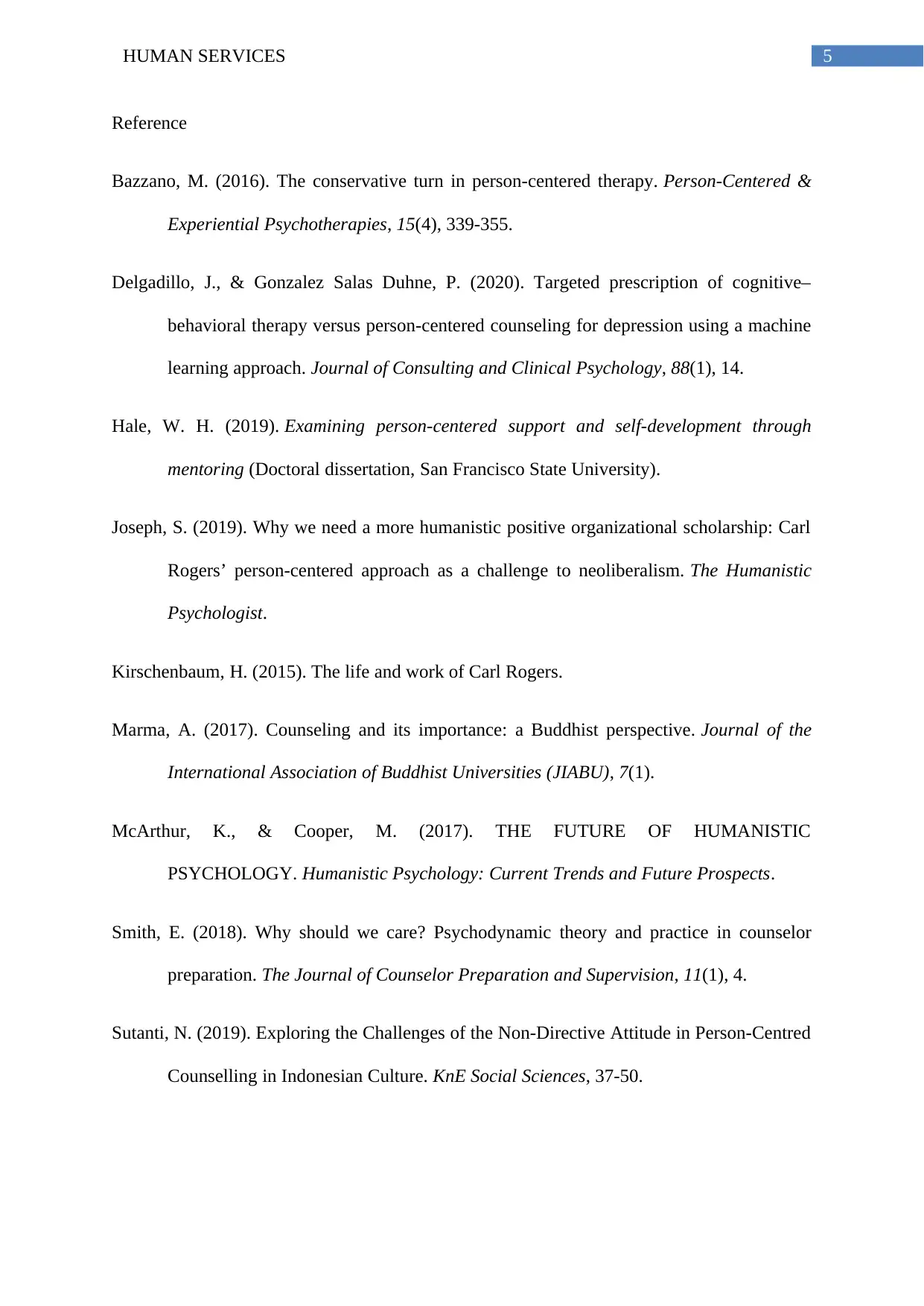
5HUMAN SERVICES
Reference
Bazzano, M. (2016). The conservative turn in person-centered therapy. Person-Centered &
Experiential Psychotherapies, 15(4), 339-355.
Delgadillo, J., & Gonzalez Salas Duhne, P. (2020). Targeted prescription of cognitive–
behavioral therapy versus person-centered counseling for depression using a machine
learning approach. Journal of Consulting and Clinical Psychology, 88(1), 14.
Hale, W. H. (2019). Examining person-centered support and self-development through
mentoring (Doctoral dissertation, San Francisco State University).
Joseph, S. (2019). Why we need a more humanistic positive organizational scholarship: Carl
Rogers’ person-centered approach as a challenge to neoliberalism. The Humanistic
Psychologist.
Kirschenbaum, H. (2015). The life and work of Carl Rogers.
Marma, A. (2017). Counseling and its importance: a Buddhist perspective. Journal of the
International Association of Buddhist Universities (JIABU), 7(1).
McArthur, K., & Cooper, M. (2017). THE FUTURE OF HUMANISTIC
PSYCHOLOGY. Humanistic Psychology: Current Trends and Future Prospects.
Smith, E. (2018). Why should we care? Psychodynamic theory and practice in counselor
preparation. The Journal of Counselor Preparation and Supervision, 11(1), 4.
Sutanti, N. (2019). Exploring the Challenges of the Non-Directive Attitude in Person-Centred
Counselling in Indonesian Culture. KnE Social Sciences, 37-50.
Reference
Bazzano, M. (2016). The conservative turn in person-centered therapy. Person-Centered &
Experiential Psychotherapies, 15(4), 339-355.
Delgadillo, J., & Gonzalez Salas Duhne, P. (2020). Targeted prescription of cognitive–
behavioral therapy versus person-centered counseling for depression using a machine
learning approach. Journal of Consulting and Clinical Psychology, 88(1), 14.
Hale, W. H. (2019). Examining person-centered support and self-development through
mentoring (Doctoral dissertation, San Francisco State University).
Joseph, S. (2019). Why we need a more humanistic positive organizational scholarship: Carl
Rogers’ person-centered approach as a challenge to neoliberalism. The Humanistic
Psychologist.
Kirschenbaum, H. (2015). The life and work of Carl Rogers.
Marma, A. (2017). Counseling and its importance: a Buddhist perspective. Journal of the
International Association of Buddhist Universities (JIABU), 7(1).
McArthur, K., & Cooper, M. (2017). THE FUTURE OF HUMANISTIC
PSYCHOLOGY. Humanistic Psychology: Current Trends and Future Prospects.
Smith, E. (2018). Why should we care? Psychodynamic theory and practice in counselor
preparation. The Journal of Counselor Preparation and Supervision, 11(1), 4.
Sutanti, N. (2019). Exploring the Challenges of the Non-Directive Attitude in Person-Centred
Counselling in Indonesian Culture. KnE Social Sciences, 37-50.
⊘ This is a preview!⊘
Do you want full access?
Subscribe today to unlock all pages.

Trusted by 1+ million students worldwide

6HUMAN SERVICES
Talley, L. P., & Jones, L. (2019). Person-Centered Supervision: A Realistic Approach to
Practice Within Counselor Education. Teaching and Supervision in Counseling, 1(2),
2.
Vasilyuk, F. E., & Karyagina, T. D. (2017). Personality and experiencing in the context of
experiential psychotherapy. И ПСИХОТЕРАПИЯ, 30.
Talley, L. P., & Jones, L. (2019). Person-Centered Supervision: A Realistic Approach to
Practice Within Counselor Education. Teaching and Supervision in Counseling, 1(2),
2.
Vasilyuk, F. E., & Karyagina, T. D. (2017). Personality and experiencing in the context of
experiential psychotherapy. И ПСИХОТЕРАПИЯ, 30.
1 out of 7
Related Documents
Your All-in-One AI-Powered Toolkit for Academic Success.
+13062052269
info@desklib.com
Available 24*7 on WhatsApp / Email
![[object Object]](/_next/static/media/star-bottom.7253800d.svg)
Unlock your academic potential
Copyright © 2020–2026 A2Z Services. All Rights Reserved. Developed and managed by ZUCOL.





